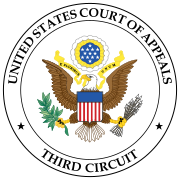| Trinsey v. Pennsylvania | |
|---|---|
 | |
| Court | United States Court of Appeals for the Third Circuit |
| Decided | August 6, 1991 |
| Citation(s) | 941 F.2d 224; 60 USLW 2129 |
| Court membership | |
| Judge(s) sitting | Dolores Sloviter, Morton Ira Greenberg, Collins J. Seitz |
| Case opinions | |
| Majority | Sloviter, joined by a unanimous court |
Trinsey v. Pennsylvania, 941 F.2d 224 (3d Cir. 1991),[1] was a case decided by the United States Court of Appeals for the Third Circuit that confirmed the validity of special elections held without a primary under the Fourteenth and Seventeenth Amendments to the United States Constitution. The case came about due to the death of H. John Heinz III, one of the U.S. senators from Pennsylvania, in a plane crash on April 4, 1991. Under the Seventeenth Amendment, state legislatures may give the Governor the power to appoint officials to fill temporarily vacant Senate seats until a special election can be held, and Pennsylvanian law contained a statute executing this and requiring no primaries for the special election. Instead, both the Democrats and Republicans would each internally select their candidates. John S. Trinsey Jr., a voter and potential candidate, asked the United States District Court for the Eastern District of Pennsylvania to declare the statute unconstitutional as a violation on the Fourteenth and Seventeenth amendments, because the lack of a primary removed his right to properly vote for candidates and delegated that power to political parties.
After deciding that the statute's subject matter necessitated the strict scrutiny approach, the District Court decided on June 10, 1991 that it was an unconstitutional violation of the right to vote for and select Senate candidates. This decision was appealed to the Court of Appeals for the Third Circuit, who decided against the use of the strict scrutiny approach and, in its absence, ruled that the statute was not a violation of the Fourteenth and Seventeenth Amendments. Academics have been critical of both the decision reached and the approach used, with one suggesting that the "substantial state interests" test used in Valenti v. Rockefeller (1968) would be more appropriate.[2]
- ^ Trinsey v. Pennsylvania, 941 F.2d 224 (3d Cir. 1991).
- ^ Gold (1992) p.216
© MMXXIII Rich X Search. We shall prevail. All rights reserved. Rich X Search
